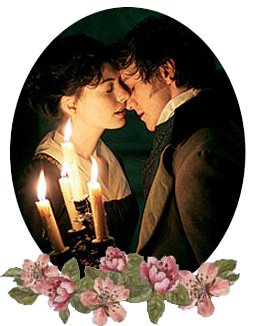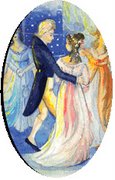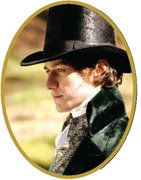Jane Austen Quote of the Week 256
 |
| Ars Rhetorica, from Vimeo |
 |
| Ars Rhetorica, from Vimeo |
Posted by
Icha
at
21:40
0
comments
![]()
Labels: Other letters, Quote of the Week
 |
| Sir Walter Scott in 1822 by Henry Raeburn |
Posted by
Icha
at
21:48
3
comments
![]()
Labels: Other letters, Quote of the Week
Tomorrow (16th December) will be Jane's 238th birthday.
There are so many quotes to pick from in order to celebrate Jane's birthday and mine might seem to be a strange choice, both because it has been used before on the blog but also because it doesnt seem to be birthday related. I love it though!
This quote is taken from chapter 5 of Mansfield Park when Mary is being spoken to about marriage.
"If one scheme of happiness fails, human nature turns to another; if the first calculation is wrong, we make a second better: we find comfort somewhere."
I think that this highlights Jane's philosophy; she recognises bad luck and events that occur in life which are out of our control but she also sees hope and gives us the courage to seek comfort in a better plan. These words are very uplifting for me and form wise advice from someone who, I believe, lived a honest, thoughtful and inspiring life.
Happy Birthday Jane!
Posted by
Rachel
at
02:55
3
comments
![]()
Labels: Mansfield Park, Quote of the Week
 |
| Our James McAvoy as dear Tom Lefroy in 'Becoming Jane' 2007 |
Posted by
Icha
at
11:28
0
comments
![]()
This week I have not chosen a Jane Austen quote but instead a quote from The Lost Memoirs of Jane Austen by Syrie James as it stood out for me this week.
"I believe there is a kind of happiness to be found in every thing in life, in all that is good and pleasing, as well as in that which is sad or poignant."
Through the work that I do I hear peoples experiences, often these experiences are intense and challenging to overcome. This is a quote that some people may disagree with on initially reading. The "kind of" is relevant as we learn from every experience and this is to vital for us developing through our lives.
Posted by
Rachel
at
05:25
2
comments
![]()
Labels: Austen-inspired books, Quote of the Week
Posted by
Rachel
at
05:24
0
comments
![]()
Labels: Austen-inspired books
I am using James Austen's "The Loiterer" for my Jane quote since I sincerely believe that Jane was influenced by his writings and she learned a lot, too. Since I have a minor in History, you will know that I love that subject and that is why I quote from James Austen's periodical "The Loiterer" Issue No. 7 this week. I will only quote a few sentences in order to pique your interest to read the entire Issue. So, speaking on the subject of "history" James writes in the second paragraph:
 Well, I make no claim to be one of the "wise and great" due to my study of history, but I have certainly learned a lot from it. I remember the old saying that "history repeats itself" and I can see history repeating itself in these present days of turmoil and troubles as well as seeing those who "turn in disgust" from these turmoils.
Well, I make no claim to be one of the "wise and great" due to my study of history, but I have certainly learned a lot from it. I remember the old saying that "history repeats itself" and I can see history repeating itself in these present days of turmoil and troubles as well as seeing those who "turn in disgust" from these turmoils.
Posted by
Rachel
at
18:32
0
comments
![]()
Labels: Family and friends, Quote of the Week
This week I am using an exchange between Mr Darcy and Elizabeth in Pride
and Prejudice when discussing "the" letter in Chapter 58 (or
volume 3, chapter 16). She begins:
Pic: Mr Darcy writing letter
Posted by
Rachel
at
19:35
0
comments
![]()
Labels: Pride and Prejudice, Quote of the Week
 |
| Apologies for being late... but I hope it's okay! |
Posted by
Icha
at
13:01
1 comments
![]()
Posted by
Rachel
at
18:49
1 comments
![]()
Labels: Austen-inspired books, Quote of the Week
It has been reported that four authors are going to be re-writing Austen's novels for modern-day readers.
Alexander McCall Smith, best known for his No 1 Ladies' Detective Agency series, is writing a version of Emma.
Sense and Sensibility will be recreated by Joanna Trollope, Northanger Abbey by Val McDermid and Pride and Prejudice by Curtis Sittenfeld.
You can read more in the Guardian article here.
Posted by
Rachel
at
18:27
0
comments
![]()
Labels: Austen-inspired books, Austen's books
 |
| The Loiterer, available from Amazon |
Posted by
Icha
at
20:51
0
comments
![]()
Labels: Jane Austen's letters, Quote of the Week
 I hope my dear namesake [his eldest son] is not forgetting his October Examination; every hour he labours now is an advance in preparing him for those duties honourable to himself and useful to the public, in which I hope to see him engaged hereafter, and I can tell him that the present exercise of his mind and the formation now of habits of close application is the way to fit him for usefulness and distinction in the future life. May God bless you all, my darling earthly treasures, and may He make us all sensible of the value of having the Lord for our God no imaginary God, but He who has made Himself known to us in His Word and by His dear Son, all others are but idols, and as John says, so say I, "Little children, keep yourselves from idols." 1 John v. 21.
I hope my dear namesake [his eldest son] is not forgetting his October Examination; every hour he labours now is an advance in preparing him for those duties honourable to himself and useful to the public, in which I hope to see him engaged hereafter, and I can tell him that the present exercise of his mind and the formation now of habits of close application is the way to fit him for usefulness and distinction in the future life. May God bless you all, my darling earthly treasures, and may He make us all sensible of the value of having the Lord for our God no imaginary God, but He who has made Himself known to us in His Word and by His dear Son, all others are but idols, and as John says, so say I, "Little children, keep yourselves from idols." 1 John v. 21.
Posted by
Rachel
at
19:15
0
comments
![]()
Labels: Memoir of Chief Justice Lefroy, Quote of the Week, Tom Lefroy Quotes
 |
| Alan Rickman as my favourite Col. Brandon from Sense & Sensibility 1995 |
"I met Mrs. Jennings in Bond Street," said he, after the first salutation, "and she encouraged me to come on; and I was the more easily encouraged, because I thought it probable that I might find you alone, which I was very desirous of doing. My object -- my wish -- my sole wish in desiring it -- I hope, I believe it is -- is to be a means of giving comfort; -- no, I must not say comfort -- not present comfort -- but conviction, lasting conviction to your sister's mind. My regard for her, for yourself, for your mother -- will you allow me to prove it, by relating some circumstances, which nothing but a very sincere regard -- nothing but an earnest desire of being useful -- -. I think I am justified -- though where so many hours have been spent in convincing myself that I am right, is there not some reason to fear I may be wrong?" He stopped.
"I understand you," said Elinor. "You have something to tell me of Mr. Willoughby, that will open his character farther. Your telling it will be the greatest act of friendship that can be shewn Marianne. My gratitude will be insured immediately by any information tending to that end, and hers must be gained by it in time. Pray, pray let me hear it."
Posted by
Icha
at
23:56
0
comments
![]()
Labels: Quote of the Week, Sense and Sensibility
This week I was on an introductory teacher training course and it was really interesting. Lots was discussed, including the historical view that boys were first in line for an education.
I have chosen a quote from Chaper 1 of Mansfield Park:
“Give a girl an education and introduce her properly into the world, and ten to one but she has the means of settling well, without further expense to anybody. ”
Posted by
Rachel
at
20:16
2
comments
![]()
Labels: Mansfield Park, Quote of the Week
 |
| The ITV Mansfield Park 2007 from fanpop.com |
Family squabbling is the greatest evil of all...
Posted by
Icha
at
21:36
0
comments
![]()
Labels: Mansfield Park, Quote of the Week




We are rolling a petition to reprint Nadia Radovici’s 1995 book titled ‘A Youthful Love: Jane Austen & Tom Lefroy?’ that is currently out of print. Please sign for the Radovici's Jane Austen & Tom Lefroy Petition and spread the words! Thanks a lot!



Jane Austen was born on

Cast:
Anne Hathaway - Jane Austen
James McAvoy - Tom Lefroy
Julie Walters - Mrs. Austen
James Cromwell - Revd. George Austen (Jane's father)
Maggie Smith - Lady Gresham
Anna Maxwell Martin - Cassandra Austen
Joe Anderson - Henry Austen
Lucy Cohu - Eliza de Feullide
Laurence Fox - Mr. Wisley
Philip Culhane - George Austen (Jane's brother)
Ian Richardson – Judge Langlois
Leo Bill – John Warren
Jessica Ashworth – Lucy Lefroy
Eleanor Methven – Mrs. Lefroy
Michael James Ford – Mr. Lefroy
Sophie Vavasseur – Jane Lefroy
Helen McCrory – Ann Radcliffe
Julian Jarrold - Director
Graham Broadbent, Robert Bernstein, & Douglas Rae - Producer
Adrian Johnston - Soundtrack
Kevin Hood & Sarah Williams - Screenplay writers
Eigil Bryld - Cinematography
Jane Gibson - Choreography
Eimer Ni Mhaoldomhnaigh - Costume
Gail Stevens & Gillian Reynolds - Casting




Jon Spence,


McAvoy knew his portrait of Tom could only come alive with the right Jane, and he found Anne Hathaway almost supernaturally suited for the part. “I don’t think we could have chosen anyone better to play Jane Austen," he says.

Jane Austen’s greatest love story was her own













‘I’m yours, Jane, heart and soul!’
~ Tom Lefroy to Jane Austen, ‘Becoming Jane’

Anything is to be preferred or endured rather than marrying without affection – JA,

Nothing can be compared to the misery of being bound without Love, bound to one, & preferring another – JA,



To be so bent on marriage, to pursue a man merely for the sake of situation – is a sort of thing that shocks me.





The film Becoming Jane has given us an image of Jane Austen that liberates our imagination. I envy readers of my book who come to it with Anne Hathaway’s image of Jane in their mind’s eye. You will not have to struggle against the image Cassandra created to see the Jane Austen who was young and pretty, lively and in love. Anne Hathaway’s skilful portrayal of Jane Austen in Becoming Jane shows that art can have as much power to bring us closer to the truth as facts themselves can.
Jon Spence,